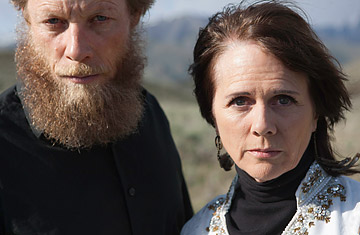
From their home in Idaho, Bob and Jani Bergdahl have been working for three years to secure their son Bowe's release
(5 of 8)
Hailey's support for Bowe Bergdahl has never wavered during his nearly three years in captivity. Zaney's River Street Coffee House, where he once worked as a barista, has become ground zero for the campaign to get him back. The cheerful, flower-bedecked clapboard building boasts signs in the window that read STANDING WITH BOWE AND GET BOWE BACK. That solidarity and respect for the Bergdahls' decision to stay quiet until now partly explains why their story has remained largely out of the public eye. The Departments of State and Defense lobbied news outlets not to report that Bergdahl was the subject of negotiations with the Taliban, arguing that news stories about him might hurt his chances of being released or even imperil his life.
Behind the scenes, the Bergdahls and the government worked in tandem. "We've been in very close contact with the Bergdahls," says a senior Administration official. "I visited with them quite a lot. They're very aware of what we have been doing, and I very much have appreciated their support."
The Pentagon has been working to locate Bergdahl since he went missing. "I can assure you that we are doing everything in our power, using our intelligence resources across the government, to try to locate him," General Martin Dempsey, Chairman of the Joint Chiefs of Staff, told reporters on May 10. "If you go to the Centcom command center, there's about a 4-by-6-ft. poster of Bowe Bergdahl sitting in front of the podium to remind them, and therefore us, every day that he remains missing in action," he said. But in a region as vast and unforgiving as North Waziristan, looking for one American soldier held hostage by a group that has long experience with captives is a humbling reminder of the limits of even the world's most powerful military.
Art Keller, a former CIA officer who took part in the agency's hunt for terrorists in Pakistan, says the few CIA agents who worked in the tribal regions when he was there in 2006 could not even leave the Pakistani army bases that hosted them. "I had a local person who worked in that area who I could only communicate with via computer," he says. "So I couldn't even meet with them."
The Haqqanis "are so conscious of the use to which we put drones that if they're going to move anyone, they'll do it in a way that we don't pick up visual traces," Keller says. "Are they going to move [Bergdahl] with a bag over his head? Even that would raise suspicion."
Another former CIA case officer in Afghanistan and Iraq, Patrick Skinner, also doubts that either local intelligence or technology is of much help in finding Bergdahl. And if he were located, sending in a SEAL team or Special Forces to rescue him in such an environment--and in Pakistani territory--would be both practically and politically hazardous. "Outside of an incredible intelligence break, or luck," says Skinner, "the way it's going to happen is that it's going to be done through back channels where everybody involved will get something."
Talking with the Enemy
